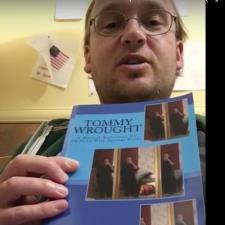306 Answered Questions for the topic speech
07/03/19
What are the punctuation rules for two pieces of direct speech in a single sentence?
Please help me with the punctuation rules for sentences with two pieces of direct speech within quotes, with the following as example.
> “It’s fun to get out on a Sunday and race,” said...
more
07/03/19
Punctuation within quotes?
When I was at school I was told that a quote should end with a comma. For example:
> "The car is on the road," said Tom.
"No it isn't," replied Dick.
"He's right — it's over there!" said...
more
07/03/19
Listening understanding problems when something is said "out-of-context"?
I have studied in UK since I was 15. I have now been here for around 8 years. I have never noticed that I have any issues with language until I started working full-time. I am very used to academic...
more
Polite/professional alternative to 'It turns out'?
I have been tasked with coming up with a nicer phrase to use than 'It turns out'. It is to be used in situations like this one:
> - 'It turns out' that we cannot...
- 'It turns out' that we...
more
Mystery behind silent letters?
I have doubts about words in the English language that have a silent letter.
So I want to know how to understand whether a letter is silent or not.
07/03/19
What one should reply to - "Can I talk to Jeremy?"?
> **Situation** I receive a call caller asked me;" Can I talk to Jeremy?"
What is correct reply and What should I respond to this situation with.
> 1. *he has gone for lunch.*
> 2. *he...
more
07/03/19
What is the appropriate phrase to say if two people are on the same track?
I am sharing my understanding regarding a particular matter with a colleague just to make sure that both of we have same understanding. This is just to avoid any conflict or confusion among us....
more
Speech Esl/esol
07/03/19
What's another way to say "which station should I get off?"?
In the context of "Which station should I get off?" (asked when you're on the train), what would be another way to say this, without using "get off" (which has other connotations) and still...
more
07/03/19
Is this worded correctly if it was spoken in an interview?
I am like a clean slate. I do not have any preconceived notions about how the company runs
07/02/19
The word "dear" in public speech?
I am a member of a Toastmaster club in the Czech republic where people work on their public speaking skills. It is a usual to open a speech by
> Dear fellow Toastmasters, dear guests,...
It is...
more
Speech Esl/esol
07/02/19
Oscar needs to understand that X is highly unlikely?
A little scenario:
> Bobs computer is behaving weird, so he asks Alice about it.
> Alice thinks Bob has a virus, she gets help from Oscar, who tells them to run an anti virus scan.
>...
more
07/02/19
Use of the word 'relishing'?
Recently when talking to a friend about the lack of elevators in Asia he told me.
> You should be relishing stairs
As a native English speaker the use of the word 'relishing' here sounded...
more
07/02/19
What's the difference between will and going to?
I have no idea what the difference between these are. I have heard that they have the same meaning, but how do they?
07/02/19
What's the correct way to write drawn-out vowels?
How should I denote drawn-out vowels in English? If I have a character with speech disorder or with a very unique accent, what is the correct way to express, in written form, this quirk of their...
more
Is there a word that means news or delivering news or searching for news that starts with "s"?
I am looking for a word that means news or related to news that starts with "s".
Are there such words?
Thanks.
07/02/19
Punctuating a quote of multiple answers?
Consider the following:
'The lecturer asked the students a question. A chorus of "yes"es was heard.'
I know that the second sentence is incorrectly punctuated, but am not sure how to sort it out....
more
07/01/19
Should the abbreviation 'i.e.' be used in speech?
I often hear people use the abbreviation 'i.e.' while speaking. It does not seem right to me. Similarly with 'e.g.' — I would always say 'for example' rather than 'e.g.'.
So is it appropriate to...
more
Speech Esl/esol
07/01/19
So, in connected speech, we can only connect A with B if A is "a strong or weak word" & B is "a weak word", right?
I discovered this rule in connected speech.
I asked this question many times but seem no one has a proper answer.
See this saying at **11:45** in [this...
more
Speech Esl/esol
07/01/19
Present perfect continuous?
I want to know about origin and duration and present perfect continuous change into past simple,by using origin and duration.
For example,
>she started playing the trumpet two years...
more
07/01/19
Why/When need some kind of short spelling or pronunciation?
In regular usage, nowadays we use short spellings of words in speaking or writing.
For example:
- They are in the cinema. => They're in the cinema.
- We have been waiting for me. => We've...
more
07/01/19
Is there a phrase, word or saying when one 'has the thought or feeling of causing hurt of mischief" despite never dreaming of acting on it?
For example I was assisting my sister in photographing a wedding. We were taking pictures as the bride was getting ready and I noticed a ketchup bottle on the kitchen table and the following popped...
more
07/01/19
Punctuation of direct speech, edge cases?
I recently learned that I have developed a consistent, but entirely wrong approach to punctuating direct speech in fiction. I am in the unenviable position of trying to relearn.
Previously I wrote...
more
06/30/19
Is there a more eloquent way to say this?
I'm writing a Salutatorian speech, and would like to say something to the effect "I'm up here and I don't know why." However, I don't know how to say it without offending anybody or seeming rude......
more
you are vs you're (informal speech)?
In some common phrases like, "You are what you eat", "Your actions reflect who you are". Is there a reason (besides it sounds funny) to not use, "You're what you eat", "Your actions reflect who...
more
06/29/19
you wouldn't know it to see it vs "you wouldn't recognize it to see it"?
Is it more correct to say, "you wouldn't know it to see it" or "you wouldn't recognize it to see"? I have tried looking both up on google, and only the first return's actual usage. Also, the...
more
Still looking for help? Get the right answer, fast.
Ask a question for free
Get a free answer to a quick problem.
Most questions answered within 4 hours.
OR
Find an Online Tutor Now
Choose an expert and meet online. No packages or subscriptions, pay only for the time you need.






















